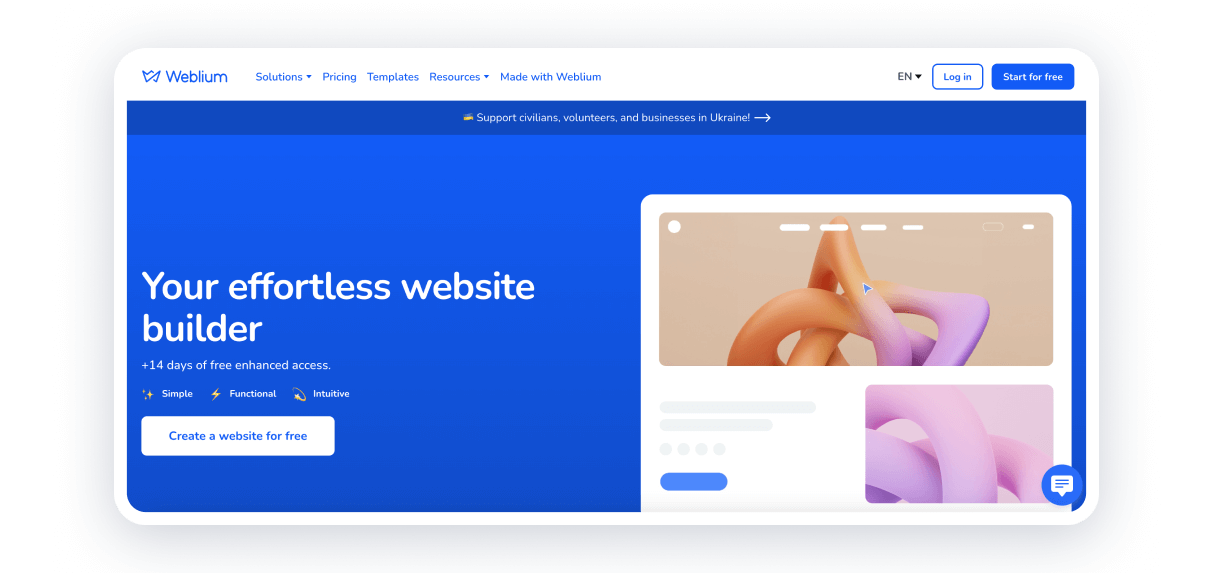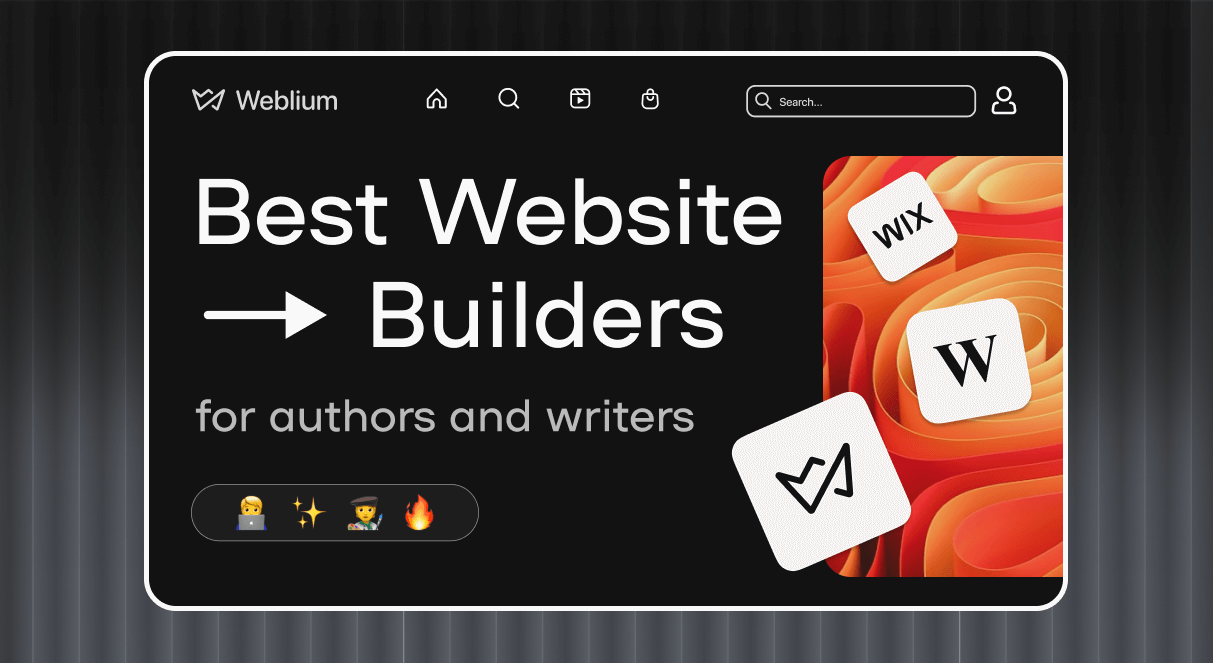
7 Best Website Builders for Authors and Writers
Nowadays, having a modern and attractive website is crucial for authors and writers. Whether you’re an aspiring novelist, a seasoned author, or a freelance creator, you need a well-crafted online space. It can serve as your portfolio, a platform to engage with your readers, and a means to sell your books directly. However, creating it from scratch can be difficult. That’s where website builders come in. They offer user-friendly tools and templates that make it easy to create a professional-looking website without much effort.
In this article, we’ll explore the top 7 author website builders, highlighting their key features to help you choose the right one for your literary needs. Some are for creating a blog to share your thoughts, and others are comprehensive platforms for launching an online store.
Contents
Comparison table of the best website builders for authors
| Name | Main feature | Price |
| Weblium | Intuitive interface | Free plan; from $8.25/month |
| Wix | Extensive template library | Free plan; from $11/month |
| Squarespace | Beautiful design templates | From $17/month |
| Jimdo | E-commerce simplicity | Free plan; from $9/month |
| WordPress | Blogging tools and CMS | Free plan; from $4/month |
| Weebly | Easy drag-and-drop builder | Free plan; from $14/month |
| GoDaddy | Beginner-friendly editor | Free plan; from $9/month |
The best website builders for authors
Creating an online presence is crucial for authors to showcase their work, engage with readers, and build a loyal fanbase. A well-designed website can serve as your digital storefront, offering a place to share your latest books, blog posts, and updates. Here are the best website builders tailored specifically for authors:
Weblium
Interface & templates
Weblium is ideal for building an author website for several reasons. Firstly, it offers a lot of pre-made templates that are mobile-friendly and tailored for specific needs. They all are well-thought-out designs, with structures and sections that will attract visitors and are easy to navigate. You only need to choose the one and add your content. Of course, if needed, you can create your own website from scratch. Weblium’s intuitive editor helps you to make it effortlessly.
The templates are divided into various categories, so it’s easy to choose the right one. It can be a CV, an online portfolio, a book landing page, or many other options. You can choose the design and then customize it, adding blocks and elements such as galleries, feedback, a timer, etc. The website can be optimized with built-in SEO tools, such as meta tags and alt text for images, helping you engage more visitors.
Third-party services & other features
Weblium offers various opportunities to show your talent to the world. You can start a blog to publish posts and share your updates with the audience. If you want to sell books, it’s easy to launch an online store. You can customize every element of the product pages to match the overall style. All orders can be found in the site setting to get full control from one place.
Need to collect inquiries? Add contact forms, customize them as you wish, and manage them easily. Weblium also has a built-in CRM, so you can get requests and access them when you have time. You can also connect your email to receive notifications and never lose important deals. Your visitors will have an excellent user experience and the opportunity to contact you through the website, and you will have full control over their inquiries.
Weblium provides users with many helpful resources. The Knowledge Base contains articles and guides, allowing users to learn its features. Videos with overviews and step-by-step instructions on how to design an author website are also available. You will never feel overwhelmed, but if you still have questions, reach our support team 24/7 via email or chat.
Weblium is the best website builder for authors looking for a quick, straightforward setup with modern templates. It offers a free plan, so you can try it first and then purchase a Pro plan, which is also the most affordable among other builders.
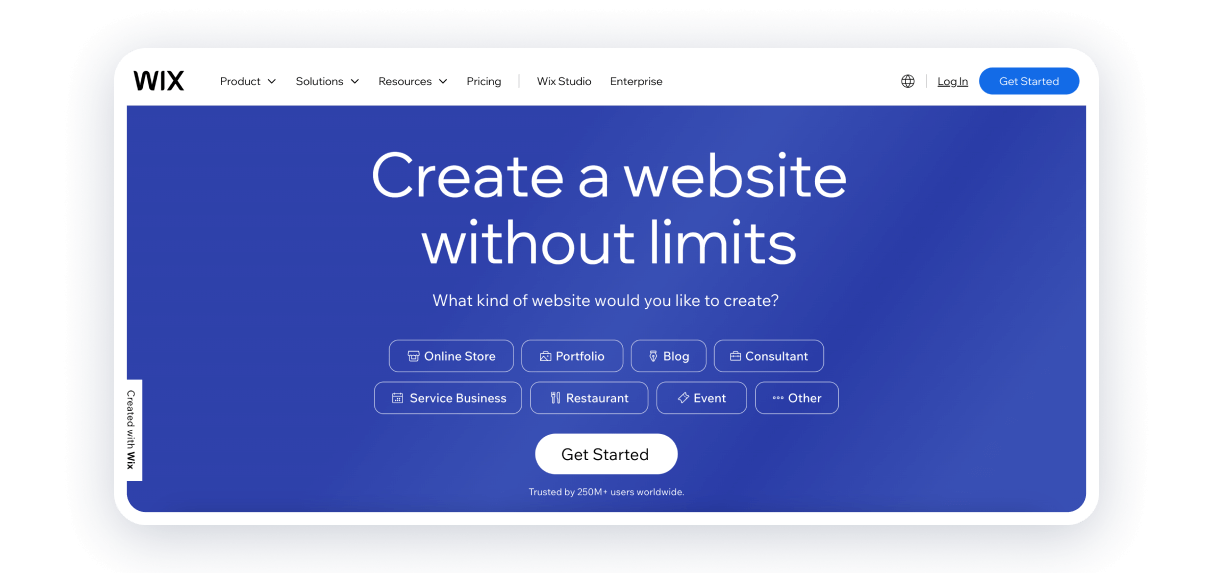
Interface & templates
With more than 900 templates, Artificial Intelligence tools, and its App market, Wix can serve as an advanced solution for those ready to create a business website to grow and scale. All templates are sorted by categories and are ready to be used for different types of websites. Designs can be customized for selling online, starting a blog, or building a community.
AI website builder can help writers set up everything quickly. They can use this tool for design, text, and layouts and get a ready website. It also suits personalizing details and generating content. Authors may not be interested in creating copies with technology, but what about images? They just need to write their ideas and get high-quality pictures.
Third-party services & other features
Wix offers various integrations, apps, and other advanced features that can be useful for authors. It has templates made specifically for blogs, a rich text editor, and video and audio add-ons. Users can create unique posts, promote them on social media, and translate content into other languages, which helps them reach a wider audience. Followers can become members if creators use full opportunities for Wix marketing.
Users can transform their websites into e-commerce platforms, monetize content, and sell products. Online store creation also starts with choosing a design or using AI. There are different options on how to sell and what to sell, including digital products and subscriptions. With the help of Wix Multilingual, it’s possible to reach an international market, so if authors are looking for people from different countries, they can try this feature. Users can go to the Help Center, Wix Encyclopedia, and Wix Blog to discover Wix opportunities.
Wix is the best website builder for authors who want creative freedom. It offers a wide range of templates and apps.
Squarespace
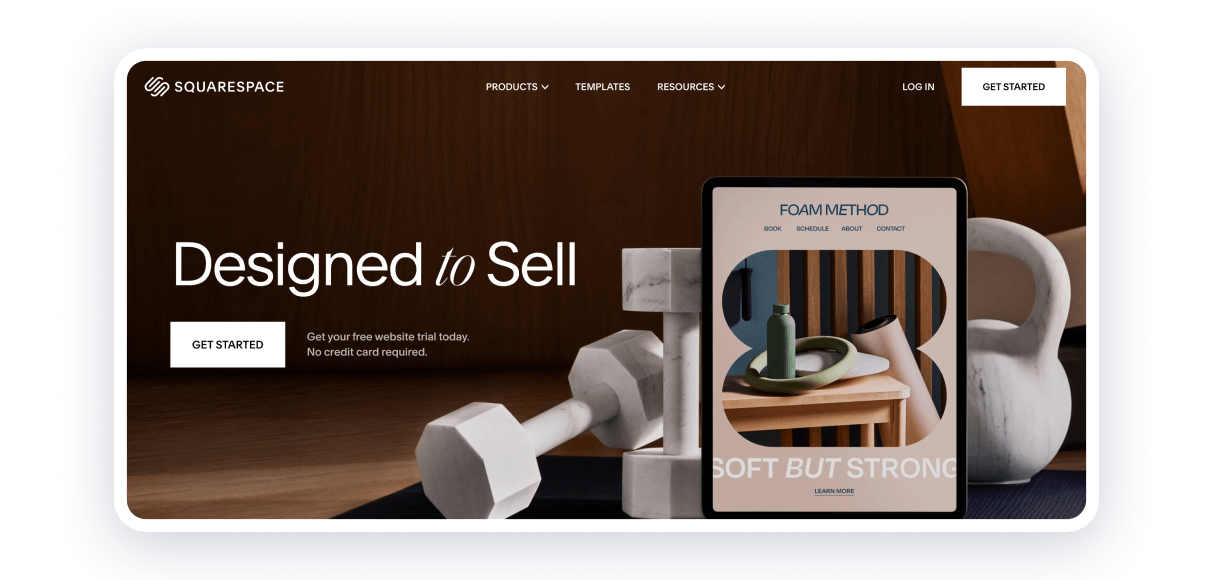
Interface & templates
Squarespace is a builder with beautiful designs and e-commerce opportunities. Once users tell what kind of website they want — professional portfolio, online store, or personal — they can choose design, fonts, and colors. Writers can use flexible templates by selecting the category and type. They are mobile-friendly and well-thought-out, enabling creators to present books, display projects, and tell about themselves.
The builder offers a more straightforward way to make a creative website with its new drag-and-drop editor, Fluid Engine. It allows users to make any changes and place content as they want. Those who don’t need such customization can use the classic editor. There is another feature for building called Squarespace Blueprint AI. Users can use it to make a website based on their preferences.
Third-party services & other features
Authors can create and manage a blog with Squarespace’s built-in blog page. It has features such as blog posts and excerpts, tags, categories, and comments. Users can also share posts on social media and schedule them. Updating the blog on the computer is easy, and the Squarespace app is convenient on mobile. To promote the website, there is built-in SEO, email campaigns, and analytic tools.
Squarespace is also an all-in-one solution for e-commerce, handling shipping, fulfillment, taxes, and payments. It’s suitable not only for selling physical products but also for selling services. Users can use Acuity Scheduling for booking and client invoicing tools. Writers can also sell subscriptions and digital content. Users can share private work with clients by adding password-protected pages. Squarespace community includes a Help Center, a forum, and webinars, which allow users to select the needed topic and learn about it.
Squarespace is the best website builder for authors looking for a professional online presence with advanced e-commerce features.
Jimdo
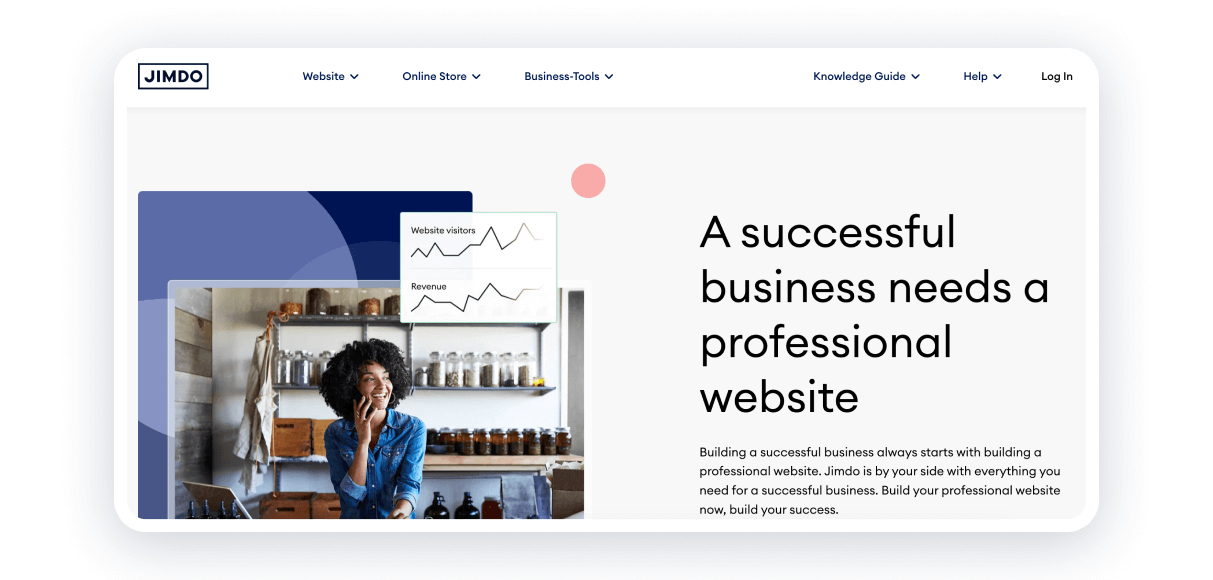
Interface & templates
Writers can create a professional website with Jimdo by answering questions, adding their information, and customizing the chosen template. They can use Artificial Intelligence to make the process easier and an Image Library to find perfect images for their needs. The builder provides tools for independent small businesses with quick setups. Whatever authors have in mind, they can implement their ideas.
Jimdo offers various templates for different professions, such as journalist, editor, and copywriter. A template can also be a portfolio or resume for self-presentation online. Styles, fonts, and colors can be changed. Users can find inspiration by browsing website examples built with Jimdo, proudly placed on the starter page.
Third-party services & other features
As mentioned before, Jimdo is the solution for writers who want to grow their businesses online. And here is why. It has many features that can help, such as automated business listings and SEO tools, which help grow the audience and engage visitors. Users can manage all their bookings in one place. It suits any event and enables automatic notifications about confirmations and cancellations.
If book authors want to create an online store, they should consider features such as 100% revenue without commission, local pickup, flexible payment methods, and different integrations. If they want to sell a book, they can upload an image, add a description, and promote it. To learn more about Jimdo, users can go to the Blog, Inspiration, and Help Center. There, they can find a lot of advice about self-employment, starting a business, website tips, and more.
Jimdo is the best website builder for writers who need a basic, no-fuss website quickly with an AI-powered builder.
WordPress

Interface & templates
WordPress is a platform that combines many different features for self-published authors. Firstly, of course, they can use hundreds of themes to create a website and publish posts. Then, it’s about the block editor, which users can use to organize content and media. Pre-built block patterns allow them to create different layouts by inserting them into pages and posts.
Another option is patterns, which allow authors to display media, highlight the latest posts, take bookings, sell things, and keep the audience engaged. The designs are responsive and professional, especially preassembled ones. This builder gives the tools to share, host, and curate galleries and stories. Built-in integrations and plugins help find the perfect image.
Third-party services & other features
Starting a blog with WordPress and publishing the first post is easy. Then, authors have the tools to expand their websites as their audience grows. The dashboard makes it easy to track blog stats, while Jetpack gives all the details with charts, graphs, and deep-dive data. The Jetpack mobile app for iOS and Android allows users to control their blog anytime. The post-scheduling feature enables them to write a post, set a publish date, and then ‘leave it to the blog to hit publish’.
Writers can be found faster with built-in SEO tools, such as URLs, automatic sitemaps, and custom titles and descriptions. There is also a built-in Reader with millions of people, so users can easily find their readers and followers. WordPress offers built-in monetization tools for shipping out merch, selling downloadable content, taking donations, and offering subscriptions and memberships. If interested, more information about the WordPress features can be found in Support, Forums, News, and Building tips. There are also video tutorials and online courses on how to create a website with this builder.
WordPress is the best website builder for writers who want full control over their website’s functionality and design. It offers thousands of themes and plugins.
Weebly

Interface & templates
Weebly allows authors to create websites using straightforward tools. They can start by building with step-by-step guides, then customize the website and use advanced features. The editor enables users to move elements and add content easily. Weebly’s free video library can be used as a background and an option for dynamic content to keep the audience engaged. It offers an image editor and site search to create a unique user experience.
The builder provides responsive themes for websites, blogs, or online stores. The collection of templates includes various designs, each of which can be customized by changing the font, header, color scheme, and other elements. Users can add custom forms and manage submissions. Weebly’s form builder is drag and drop and has integrations for better engagement.
Third-party services & other features
Writers can store and access the form responses. After submission, the data is sent via email and stored on the site’s dashboard. Weebly offers all-in-one e-commerce features to simplify order management, shipping, and payments. Integrated marketing tools help to reach more visitors. Writers can use apps from the market, for example, to boost traffic or get social.
Authors can start a blog and create writing quickly. The builder offers blog templates and SEO. The advanced tools include blog management — users can customize moderation and approval settings. Really Simple Syndication (RSS) and social sharing features enable messages to be shared across various channels. To stay connected, it’s possible to publish with the Blog Post Editor, respond to blog comments, and form entries from mobile. Weebly provides resources to get to know it better, such as a blog, success stories, and developer docs.
Weebly is the best website builder for writers searching for ease of use with blogging and simple e-commerce.
GoDaddy
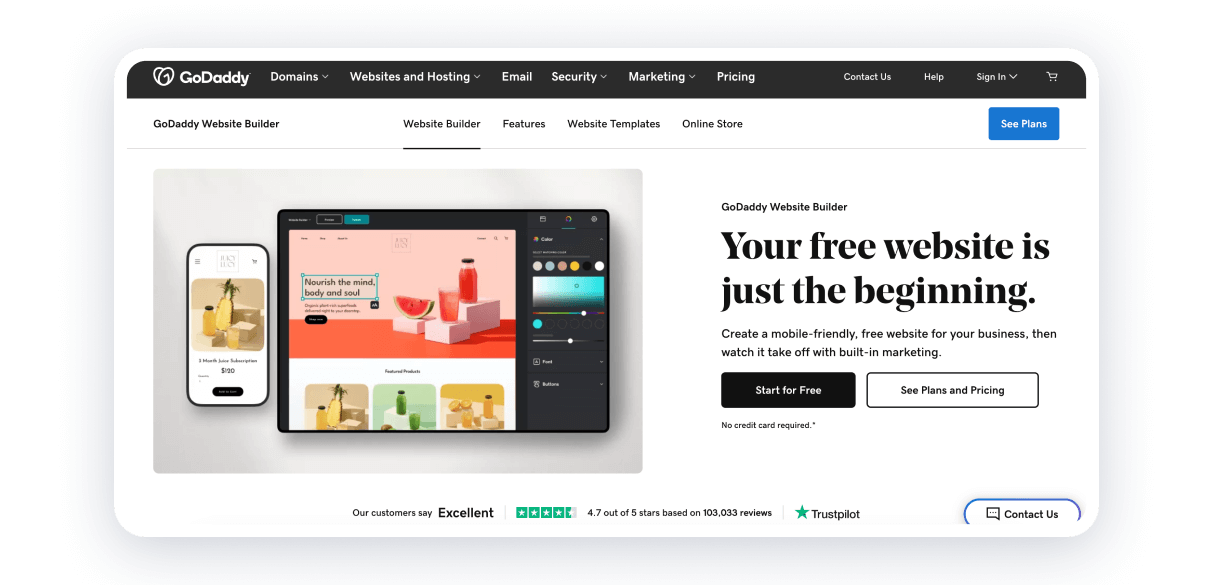
Interface & templates
GoDaddy is a platform that offers various opportunities for different needs. It starts as a provider and builder, but there are also tools for marketing, blogs, and selling. It allows users to build websites quickly with ready-to-launch templates. They can choose colors, fonts, and layouts, and then add text and photos. GoDaddy has AI tools for domains, logos, and more.
The templates are divided into groups, and users can create a website after choosing the most suitable one. They can edit and customize it on the go by clicking and dragging to reorder. Promo banners, contact forms, calls to action — adding any necessary elements to engage visitors is easy.
Third-party services & other features
GoDaddy is known for its WordPress plans, which include access to themes and plugins, integrations, and building tools. Users can also easily add a blog to their website and publish posts using basic image editing, categories, and BYOB (Bring Your Own Blog). Synchronization with social media includes Facebook and Instagram so writers can manage posts from the GoDaddy dashboard. Marketing Planner notifies users of upcoming events to engage more customers.
GoDaddy offers e-commerce features that allow authors to sell what they want, whether products, services, or digital content. Everything is managed from one place, and it’s convenient to monitor. Main features include tracking Google search ranking, orders, and email campaigns. The platform also offers GoDaddy InSight Score. There are many resources with detailed descriptions of features and plans, such as the Help Center and videos.
GoDaddy is the best website builder for writers who need a platform offering quick web design creation and marketing tools.
How to choose the best website builder for authors?
Before diving into specific website builders, you need to clearly understand what you need from your author’s website. Consider the following aspects:
Step 1: Determine your goals
- If your primary goal is to showcase and sell your books, you’ll need e-commerce features (online store, SEO, analytics).
- If you want to build your personal brand and engage with your audience, focus on design flexibility, blogging options, and social media integration.
Step 2: Estimate your budget
- If you’re on a tight budget, look for platforms that offer free plans or affordable pricing.
- If you have a budget for professional design, you might prefer a premium platform or even hire a developer for customization.
Step 3: Investigate and get inspired
- Find websites you like and try to analyze what exactly catches your eye – memorable logo and styles, colors, or engaging elements.
- Discover builders’ main features, such as templates and business tools, and look for websites made with this platform.
Step 4: Make your decision and sign up
- Many builders offer trials, so you can try the main features and understand if they fully suit you.
- Builders like Weblium offer a free plan, so you can use basic functionality for free and then buy a subscription to access more tools and benefits.
Conclusion about website builder for authors
Choosing the right author website builder depends on your specific needs, such as ease of use, customization options, SEO features, and budget. Here’s a conclusion on the options listed.
- If you value creative freedom and advanced features, Wix or WordPress would be ideal. Squarespace and Weebly is a solid choice for a polished, professional look with less effort.
- If simplicity and speed are your priorities, Weblium, Jimdo, or GoDaddy could be the way to go.
Want to create an author website for free? Try Weblium right now and have your own online space!
FAQ about author website builders
What website builder do authors use?
Different builders have their own benefits. Squarespace is popular for its sleek, professional design templates. Wix is known for its number of templates and apps. Weblium is an excellent choice for its intuitive editor and ease of use.
Where is the best place to make an author website?
WordPress and GoDaddy are favored for their flexibility and the wide range of plans available. Weebly and Jimdo are suitable for those who want to launch a site and connect third-party services quickly.
Do I really need an author website?
Yes, an author website serves as your digital business card, providing a central hub for readers, publishers, and media to learn more about you and your work. It is also an essential marketing tool, allowing you to showcase your projects, share updates, and sell books.
How should an author website look?
The main steps you can take are to ensure the site is easy to navigate and looks great on mobile devices, prioritize readability with simple fonts and a clean layout, and reflect on your genre and personal brand. It’s also better for the website to include your bio, work, and contact information.
